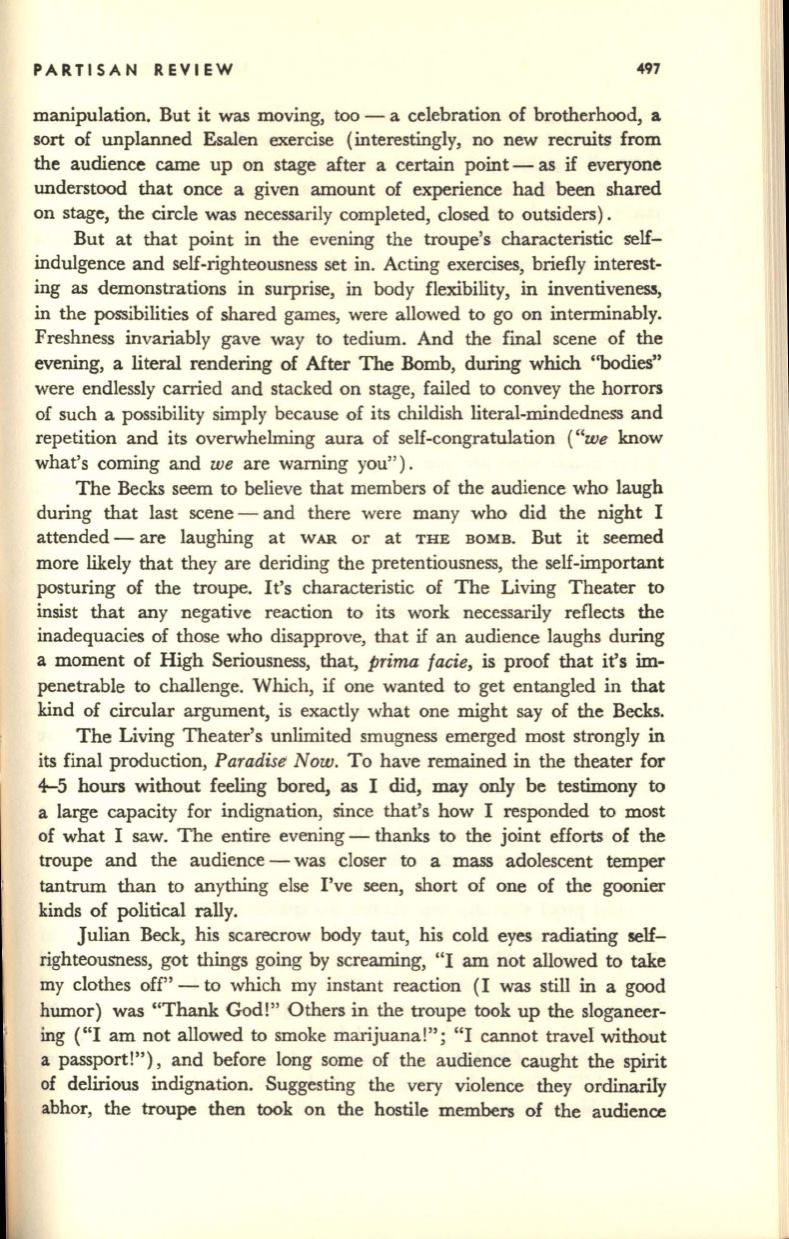
PARTISAN REVIEW
497
manipulation. But it was moving, too - a celebration of brotherhood, a
sort of unplanned Esalen exercise (interestingly, no new recruits from
the audience came up on stage after a certain point - as
if
everyone
understood that once a given amount of experience had been shared
on stage, the circle was necessarily completed, closed to outsiders).
But at that point in the evening the troupe's characteristic self–
indulgence and self-righteousness set in. Acting exercises, briefly interest–
ing as demonstrations in surprise, in body flexibility, in inventiveness,
in the possibilities of shared games, were allowed to go on interminably.
Freshness invariably gave way to tedium. And the final scene of the
evening, a literal rendering of After The Bomb, during which "bodies"
were endlessly carried and stacked on stage, failed to convey the horrors
of such a possibility simply because of its childish literal-mindedness and
repetition and its overwhelming aura of self-congratulation
rOwe
know
what's coming and
we
are warning you").
The Becks seem to believe that members of the audience who laugh
during that last scene - and there were many who did the night 1
attended - are laughing at
WAR
or at
THE BOMB.
But it seemed
more likely that they are deriding the pretentiousness, the self-important
posturing of the troupe. It's characteristic of The Living Theater to
insist that any negative reaction to its work necessarily reflects the
inadequacies of those who disapprove, that
if
an audience laughs during
a moment of High Seriousness, that,
prima facie,
is
proof that it's
im–
penetrable to challenge. Which, if one wanted to get entangled in that
kind of circular argument, is exactly what one might say of the Becks.
The Living Theater's unlimited smugness emerged most strongly in
its final production,
Paradise Now.
To have remained in the theater for
4-5 hours without feeling bored, as 1 did, may only be testimony to
a large capacity for indignation, since that's how 1 responded to most
of what 1 saw. The entire evening - thanks
to
the joint efforts of the
troupe and the audience - was closer to a mass adolescent temper
tantrum than to anything else I've seen, short of one of the goonier
kinds of political rally.
Julian Beck, his scarecrow body taut, his cold eyes radiating self–
righteousness, got things going by screaming, "I am not allowed to take
my clothes off" - to which my instant reaction (I was still in a good
humor) was "Thank God!" Others in the troupe took up the sloganeer–
ing ("I am not allowed to smoke marijuana!"; "I cannot travel without
a passport!"), and before long some of the audience caught the spirit
of delirious indignation. Suggesting the very violence they ordinarily
abhor, the troupe then took on the hostile members of the audience


